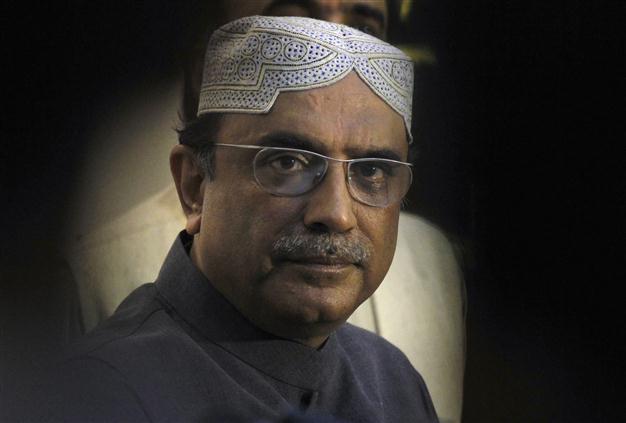Zardari to leave Dubai hospital Thursday
ISLAMABAD - Agence France-Presse

In this Aug. 15, 2010 file photo, Pakistan's President Asif Ali Zardari listens to a reporter at a press conference in Rawalpindi, Pakistan. Pakistani President Asif Ali Zardari's associate said Tuesday, Dec. 13, 2011 that the leader suffered a 'mini-stroke. AP photo
Pakistan President Asif Ali Zardari is to be discharged from a Dubai hospital on Thursday after more than a week, but will remain in the Gulf emirate to rest with no date fixed for his return home.
The government made the announcement eight days after the president flew suddenly to the United Arab Emirates in the midst of a political scandal, forcing aides to deny that he was seriously ill or about to step down.
"All tests are clear and the doctors plan to discharge the president from hospital tomorrow to take rest at home and continue the heart medication," presidency spokesman Farhatullah Babar told AFP.
"The president is recovering and the doctors have advised him complete rest," Babar said.
Zardari would leave hospital for his house in Dubai, but Babar declined to comment on when the 56-year-old head of state would return to Pakistan.
Nor has any definitive diagnosis of Zardari's condition been made public.
Last week, a senior member of his Pakistan People's Party (PPP) told AFP that Zardari had probably suffered a transient ischemic attack, or mini-stroke.
His Doctor Khaldoun Taha issued a statement from the American Hospital saying that Zardari was admitted on December 6 with "left arm numbness and twitching" after losing consciousness for a few seconds.
Zardari has a long-standing heart condition, but was admitted "fully awake and conscious with stable vital signs", Taha said.
Cardiac and neurological tests were conducted, including a brain scan, but "all investigations were within normal range", the doctor said.
He was now advised to rest at home and continue "regular heart medications".
Zardari is technically a figurehead president, whose loyal prime minister is responsible for the day-to-day running of the government.
The military largely controls foreign and security policy, such as the latest crisis in US relations caused by NATO's killing of 24 Pakistani soldiers in cross-border strikes on November 26.
Zardari has been under considerable pressure over alleged attempts by a close aide to seek US help to limit the power of Pakistan's military.
The aide, Pakistan's ambassador to Washington Husain Haqqani, was forced to resign over the allegations and Zardari's flight to Dubai sparked a flood of speculation that he too may step down.
The memo sent in May to the then US Chairman of the Joint Chiefs of Staff, Admiral Mike Mullen, sought help to prevent a feared coup following the secret US raid that killed Osama bin Laden on May 2.
Zardari is recognised as an astute politician who has survived numerous crises and calls for his resignation since he took office in 2008.
If he remains in office until 2013 and elections are held it would be the first democratic transition of power in Pakistan, where the military has staged four coups and ruled for more than half the country's existence.
Largely unpopular, he became president only as co-chairman of the PPP after his wife, former prime minister Benazir Bhutto, was assassinated.
